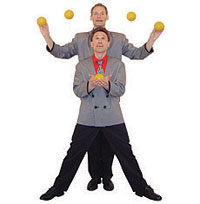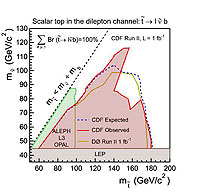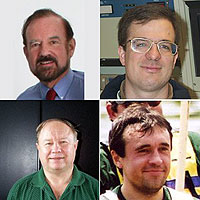|
Thursday, Sept. 23
- Breakfast: apple sticks
- Minnesota wild rice w/chicken
- Tuna melt on nine grain
- Italian meatloaf
- Chicken casserole
- Buffalo crispy chicken wrap
- Assorted sliced pizza
- Mandarin chicken
Wilson Hall Cafe Menu
|
|
Thursday, Sept. 23
Dinner
- Stuffed mushrooms
- Blackened grouper
- Dirty rice
- Maque choux
- Mocha fudge bread pudding
Wednesday, Sept. 29
Lunch
- Brandy-pork tenderloin
- Cauliflower gratin
- Cinnamon apple crisp
Chez Leon Menu
Call x3524 to make your reservation.
|
|
|
Physics for Everyone: New lecture series begins Oct. 6
Many of us don't have scientific or technical degrees. We aren't scientists, engineers or technicians. But we do work here. We play an integral role in the success of the laboratory's scientific projects and experiments by making sure that the individuals working on those projects have the budget, materials and permissions they need, can get to meetings in other states or countries and receive proper training.
But all too often, we only know enough to do our jobs. We might not understand how that project or experiment works, what it is looking for and why it matters to all of us in the long run. We might not really even understand the ultimate goals of the laboratory, how it came to exist and what our future holds.
Starting Oct. 6, a new lecture series aims to change all of that. "Physics for Everyone" is a non-technical lecture series about Fermilab science and culture. On the first Wednesday of each month, Fermilab scientists and staff will give a one-hour, straight-forward, plain English lecture on one of a wide variety of topics, including the history of the laboratory, how particle physics benefits society and even the laboratory's involvement in cancer therapy.
This lecture series is organized by the Diversity Council Subcommittee for Non-Scientific and Non-Technical Employees.
The first lecture will take place from 12:30-1:30 p.m. on Wednesday, Oct. 6, in Curia II, WH second floor crossover. Scientist Herman White will discuss the laboratory's past and present and take a look at some of the areas Fermilab will focus on in the future. There will be time for questions and answers. Please come to learn about the laboratory and its many aspects.
-- Rhianna Wisniewski, Diversity Council subcommittee member
|
Health fair today 11:30 a.m to 1 p.m. in Wilson Hall atrium
The Benefits and Recreation Department will sponsor an employee health fair from 11:30 a.m. to 1 p.m. today in the Wilson Hall atrium. This year's theme is healthy aging. Attendees can visit vendor booths to sign up for free giveaways, and get free mini massages, muscle scans and bone density screenings. For more information call Jeanne in the Recreation Department at x2548.
|
Gizmo Guys juggle at 7 p.m. Saturday at Fermilab
 |
| The Gizmo Guys will perform this Saturday, Sept. 25, at 7 p.m. in Ramsey Auditorium. |
Performing as the Gizmo Guys, the juggling duo of Allan Jacobs and Barrett Felker has amazed and amused audiences around the world. On Saturday, Sept. 25, they take their side-splitting act to Fermilab to entertain people of all ages.
Touring worldwide since 1987, they've appeared before over a million people in more than 2,500 live performances, and for many more on television.
Though juggling is the centerpiece of their show, Jacobs and Felker toss in quick wit and a rapid-fire repartee to create an act that delights with both comedy and dazzling stunts.
Felker won the International Jugglers Association's Team Championship in 1980. He later launched a solo career by taking an eight-week contract with the Harlem Globetrotters, which was extended time and again over three years. Afterward, he settled in Europe, where he worked his solo act in circuses and variety theaters.
Jacobs co-founded the comedy group Slap Happy, which was twice awarded Best Comedy of the Year by The Boston Globe and made numerous appearances on local and national television. He also won the International Jugglers Association's Solo Championship in 1983.
The Gizmo Guys will perform at the family-friendly time of 7 p.m. in Ramsey Auditorium. Tickets are $16 for adults and $8 for attendees 18 and under.
Learn more.
|
Fermilab moving ahead with new accelerator project
From Kane County Chronicle, Sept. 22, 2010
Fermilab has started work on a new facility that scientists there believe is critical to the next generation of particle accelerators.
"Our future is going to involve accelerators that use superconducting radio-frequency technology," said Jay Theilacker of Fermilab's Accelerator Division. "Building this new SRF test facility is an important step forward."
Fermilab officials on Tuesday gave media tours of the facility that is expected to be done by the fall of 2011. The laboratory has started phase II of the new facility, which will occupy three buildings and host a 460-foot-long test accelerator.
Read more
|
|
|
Searching for super top
 |
| The image shows excluded regions in the sneutrino versus stop mass plane. The new CDF results are shown shaded in red with the exclusion limits expected prior to examining the data. Previous results from DZero and LEP are also included. |
Although the Standard Model has been phenomenally successful in describing the known particles and their interactions, it does have some disturbing features.
Scientists believe that the Higgs boson is the mediator of mass and the last unobserved piece of the Standard Model. Physicists calculate where to look for this particle. To avoid an unrealistically large mass for the Higgs boson, these physicists must fine-tune very large quantum corrections so that they cancel each other out.
The Standard Model also has no explanation for dark matter, which physicists believe constitutes about 23 percent of the density (or mass energy) of the universe. An elegant solution to this dilemma can be found in the Minimal Supersymmetric Standard Model. This model predicts that all known particles have twin partners that differ only by a half unit of spin. These particle pairs naturally provide the cancellation necessary to allow for a more reasonable mass for the Higgs boson. The MSSM also predicts a stable particle, called a low mass neutralino, consistent with the known properties of dark matter, providing an attractive solution to this mystery of the universe.
The CDF experiment conducted a search for one of the particles predicted by MSSM. The supersymmetric partner of the top quark, called stop, can in some scenarios be light enough that its discovery at the Tevatron is a realistic possibility. CDF searched for a stop quark decaying into a bottom quark, a lepton (an electron or muon), and an undetected supersymmetric neutrino (sneutrino). According to the MSSM, stop quarks are produced in pairs. In their search, experimenters expected to find two oppositely charged leptons, two jets of particles arising from the decay of the bottom quarks, and missing energy from the undetected sneutrinos.
The CDF experimenters found that the small number of events satisfying their search criteria were statistically consistent with the number expected from Standard Model background sources. Although CDF experimenters found no evidence for supersymmetry, they were able to set limits on the stop quark and sneutrino masses, as shown in the figure.
Learn more
-- edited by Andy Beretvas
 |
| Top row from left: Virgil Barnes, Purdue, and Oscar Gonzalez, Madrid, Spain. Bottom row: Alvin Laasanen and Alexei Sedov, Purdue. |
|
|